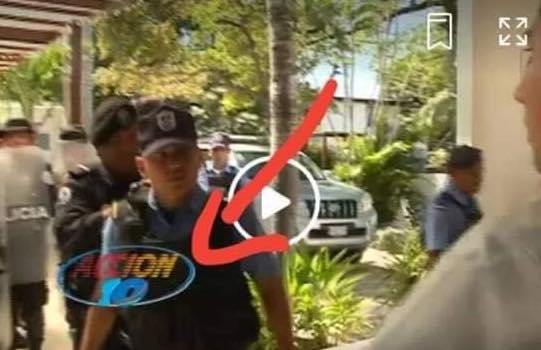29 de enero 2020

Children of Exile: The Births “Sowing Hope” in the Camp of Nicaraguan Farmers

PUBLICIDAD 1M
PUBLICIDAD 4D
PUBLICIDAD 5D
Wilih Narvaez was attacked and threatened while covering a book presentation in Managua

Reporter Wilih Narvaez was attacked and threatened last Thursday by Nicaragua’s anti-riot police while covering an attempted opposition protest in Managua, according to Channel 10, the news outlet for which Mr. Narvaez works.
“Riot police cornered and physically attacked our reporter, Wilih Narvaez, along with other reporters covering a spontaneous street demonstration at a hotel located in the capital,” said Channel 10, the news outlet with the largest audience in Nicaragua. Channel 10 published images of the attack.
According to the images, the journalist was struck on the arm with a police bludgeon and kicked in the groin area. The attack occurred following a book presentation in a Managua hotel.
Those attending the book presentation attempted to carry out a spontaneous street demonstration against the Daniel Ortega government, but police prevented them from doing so and assaulted the reporter.
After being struck, Wilih Narvaez complained to one of Managua’s police chiefs, Fernando Borge, who ignored him. Narvaez called the agents who had attacked him cowards. The police have not commented on the assault against the reporter.
The Nicaraguan Center for Human Rights (CENIDH) condemned the attack and demanded that the Ortega government respect free speech, as well as the physical and psychological integrity of journalists.
The organization Defenders of the People repudiated the police attack against Channel 10’s reporter, noting that the country’s constitution protects the right to inform and be informed. “The Nicaraguan State must guarantee these rights and their application,” the organization demanded.
As a result of police and government violence and attacks, at least 90 journalists have had to leave Nicaragua, according to the Violeta Barrios de Chamorro Foundation, which has also recorded at last 1,080 cases of violations of freedom of the press, including assault, censorship, threats and murder, among other violations of the law.
Nicaragua has been suffering from a sociopolitical crisis since April 2018, with at least 328 deaths, according to the Inter-American Commission on Human Rights (IACHR), although local organizations have elevated that total to 684. The Ortega government recognizes 200 deaths and decries an attempted coup d’état.
Archivado como:
PUBLICIDAD 3M
Agencia de noticias internacional con sede en Madrid, España. Fundada en Burgos durante la guerra civil española en enero de 1939.
PUBLICIDAD 3D